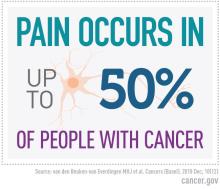
During chemotherapy for an advanced blood cancer, Stacey Blansky vaped marijuana daily for her nausea and used cannabis oil for anxiety and stress. The decision to add these complex, plant-derived substances to ease her treatment’s side effects came after doing her own research on possible… Learn more
POSTED: 2/24/2021
SOURCE: Cancer Prevention Science Blog

Millions of older Americans take aspirin daily to reduce their risk for heart disease and colorectal cancer. But, new data suggests this protective edge for colorectal cancer comes only if they begin taking aspirin before age 70.
In a pooled analysis of… Learn more
POSTED: 2/11/2021
SOURCE: Cancer Prevention Science Blog

The executive summary is available of an inaugural workshop to encourage and forge partnerships between oncologists, primary care providers and medical specialists to promote accrual to clinical cancer control and prevention trials conducted by the NCI Community Oncology Research Program (NCORP).
POSTED: 2/4/2021
SOURCE: NCI NCORP News
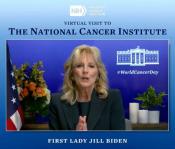
Dr. Jill Biden, Ed.D., First Lady of the United States, joined NCI leaders and staff for a special virtual event marking World Cancer Day, February 4. Among the progress highlighted was the work of the NCI Community Oncology Research Program (NCORP) in bringing clinical trials to diverse… Learn more
POSTED: 2/4/2021
SOURCE: DCP News
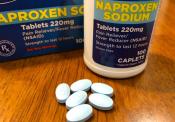
An over-the-counter drug, readily available to consumers for years, may open a new option for preventing colorectal cancer in high-risk individuals.
It's not the mouse that roared but the quiet mouse behind the scenes that inspired researchers to look at the anti-inflammatory drug, naproxen, said… Learn more
POSTED: 2/3/2021
SOURCE: Cancer Prevention Science Blog
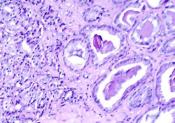
This month, the Early Detection Research Network (EDRN) marks its 20th anniversary. The National Cancer Institute (NCI) launched the network in 2000 with the goal of identifying and harnessing biomarkers as a way of detecting cancer at earlier stages. Today, the network comprises more than 300… Learn more
POSTED: 12/21/2020
SOURCE: AACR Cancer Research Cataylst Blog

DCP Director Philip E. Castle, Ph.D., M.P.H.
As this unforgettable year of 2020 comes to an end, I am reaching the milestone of my first 6 months as Director of the NCI Division of Cancer Prevention (DCP). It has been a whirlwind of virtual meetings and… Learn more
POSTED: 12/17/2020
SOURCE: Cancer Prevention Science Blog

The SWOG Cancer Research Network is opening to accrual the MiCHOICE Trial to study the use of decision support tools by women with high-risk breast conditions and their healthcare providers to choose among chemoprevention… Learn more
POSTED: 12/8/2020
SOURCE: Cancer Prevention Science Blog

If you were concerned that you might be at increased risk for a specific kind of cancer, what would you do to confirm that risk, and what would you be willing to do to reduce that risk? The answer is likely to be, "it depends on your doctor."
Quotes from Focus Group Participants
"The claim of… Learn more
POSTED: 11/19/2020
SOURCE: Cancer Prevention Science Blog

In a commentary written by several of its clinical scientific leaders, changes were proposed to the National Cancer Institute (NCI) clinical trials program to improve clinical trial availability, effectiveness, and diversity.
The article, “COVID-19, Social Justice, and Clinical Cancer Research,”… Learn more
POSTED: 11/16/2020
SOURCE: DCP News

This issue reveals a metaproteomic approach to assessing the gut microbiome, genestein’s effect on remodeling pathways to suppress kidney cancer, and neferine from lotus seeds pro-oxidant anticancer mechanisms. Meet our… Learn more
POSTED: 10/29/2020
SOURCE: DCP News
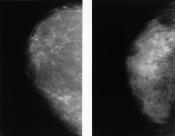
DCP Director Philip E. Castle, Ph.D., M.P.H.
In the month of October, breast cancer awareness is the health message that looms large. Yet, researchers across the National Cancer Institute and across the world are focused on breast cancer all the time.… Learn more
POSTED: 10/19/2020
SOURCE: Cancer Prevention Science Blog
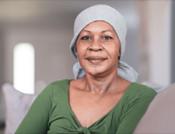
NCI has launched the Cancer Moonshot℠ Biobank to procure and distribute longitudinal patient biospecimens for cancer research exclusively through 20 community research sites in the NCI Community Oncology Research Program (NCORP).
Both the biobank pilot study, "NCORP Tissue Procurement Protocol: An… Learn more
POSTED: 10/19/2020
SOURCE: NCI DCTD News
The National Cancer Institute was directed by Congress "to develop, validate, improve, and implement serological testing and associated technologies" to characterize the immune responses elicited by SARS-CoV-2 viral infection.
As part of the response, the institute established Serological Sciences… Learn more
POSTED: 10/8/2020
SOURCE: DCP News

The impact of the COVID-19 pandemic on cancer research and clinical trials, and the growing use of telemedicine garnered much of the focus during Part 1 of the annual meeting of the NCI Community Oncology Research Program (NCORP) on Aug. 31. Part 2 scheduled for October 6, will focus on progress… Learn more
POSTED: 9/29/2020
SOURCE: NCI NCORP News
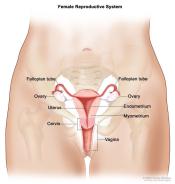
Research to uncover how and why benign gynecologic conditions like endometriosis or uterine fibroids progress to invasive and deadly ovarian cancer or uterine sarcomas, is a critical and overlooked issue in women’s health.
POSTED: 9/28/2020
SOURCE: Cancer Prevention Science Blog
DCP Director Philip E. Castle, Ph.D., M.P.H.
Coming on board as the Division of Cancer Prevention (DCP) Director in July 2020 was a unique challenge. COVID is a serious problem now, but we have faith in science that it will be solved soon. While cancer is… Learn more
POSTED: 9/11/2020
SOURCE: DCP News
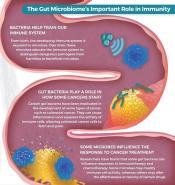
As the availability and sophistication of smart technology for health (such as wearables, sensors, and micro-robotic tools) continues to increase, these devices could prove transformative in cancer prevention. Two ongoing Division of Cancer Prevention (DCP) funding opportunities are promoting the… Learn more
POSTED: 9/8/2020
SOURCE: Cancer Prevention Science Blog

Numerous studies have suggested that people who regularly take low doses of aspirin may have reduced risks of being diagnosed with or dying from cancer. But new findings from a randomized clinical trial, called ASPREE, suggest that the same may not hold true for older adults.
The study… Learn more
POSTED: 8/18/2020
SOURCE: Cancer Currents Blog

This issue reveals zinc’s chemopreventive activity for Barrett’s Esophagus, the nutritional environment and intestinal stem cell’s contribution to colorectal cancer, and Sirt1 signaling in astrocytes’ contribution to… Learn more
POSTED: 7/30/2020
SOURCE: DCP News
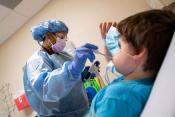
When the coronavirus pandemic reached the United States, thousands of people with cancer were participating in clinical trials, including many at St. Jude Children’s Research Hospital in Memphis, Tennessee.
At St. Jude, investigators took steps to reduce the risk that children participating in… Learn more
POSTED: 6/29/2020
SOURCE: NCI Cancer Currents Blog
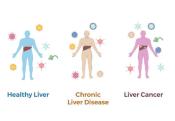
Scientists have developed a new test that can help identify people who are likely to develop hepatocellular carcinoma (HCC), the most common form of liver cancer. The approach uses a simple blood test to check for the patient’s previous exposure to certain viruses.
A study of the new approach was… Learn more
POSTED: 6/11/2020
SOURCE: NCI Press Release
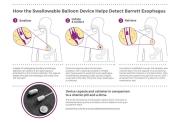
EsoCheck™ and EsoGuard™
NCI Annual Plan & Budget Proposal for Fiscal Year 2020 (PDF, 17.4 MB)
A new technology coupled with a new biomarker test now in clinical trials are giving patients timely access to a quick, accurate and less invasive way to… Learn more
POSTED: 6/1/2020
SOURCE: Cancer Prevention Science Blog

With the sudden explosion of the COVID-19 pandemic, we are all living with a great deal of fear, uncertainty, and anxiety. As an oncologist and cancer researcher, I know that those feelings are heightened for many people with cancer.
POSTED: 5/21/2020
SOURCE: NCI Cancer Currents Blog
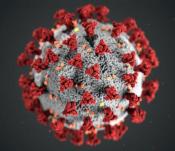
COVID-19 is an emerging, rapidly evolving situation. In addition to the information sources listed in the web header, the National Cancer Institute and the Division of Cancer Prevention have issued guidance for DCP investigators during the COVID-19 pandemic. Those materials are consolidated here… Learn more
POSTED: 5/7/2020
SOURCE: DCP News
